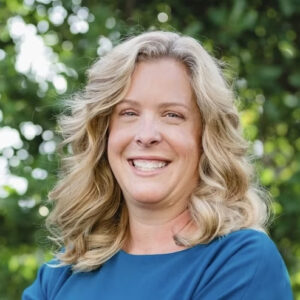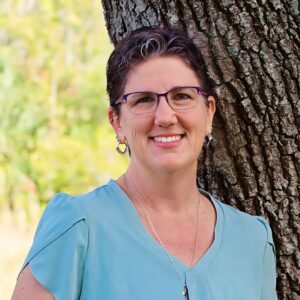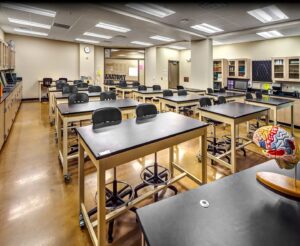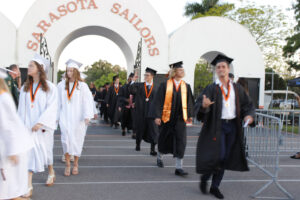Two school board members share how state funding for private schools will impact Sarasota and Manatee students.
By Tamara Solum
Original Air Date: May 28, 2025
Host: Between the Trump administration’s shrinking and possibly dismantling the U.S. Department of Education and state funding for public schools shifting towards private schools under Florida’s new voucher program, there will likely be cuts to local education programs. WSLR News reporter Tamara Solum talked to two local school board members.
Tamara Solum: Sarasota School Board member Liz Barker and Manatee School Board member Heather Felton spoke to me about what is on the line in their districts and what they want parents and stakeholders to know.
As the Florida governor and the state House are fighting over what taxes to cut, the legislative session has been extended, and Florida House Bill 5101 and its Senate companion bill are still in play. They propose spending cuts and reappropriations that would impact Career and Professional Education and college-readiness programs. Tens of thousands of students on the Suncoast could be affected by cuts to dual enrollment, International Baccalaureate, Advanced Placement, and other programs.
Liz Barker, elected to the Sarasota school board last August, explains that, already, funding is not covering costs.

Liz Barker
Liz Barker: Both current budget plans will result in a cut to the money that we actually have available to us to educate. Then there’s this messaging from the legislature that they’re increasing our flexibility by adding funds to the base student allocation, but in reality, the amount that they add does not even cover our mandated costs from that same legislature.
TS: Heather Felton, elected last November to the Manatee School Board, is a former International Baccalaureate teacher at Southeast High School, a Title One High School in Bradenton. She predicts that legislators will say schools aren’t losing funding, but they are wrong.

Heather Felton
Heather Felton: When you look at the way in which the legislature is explaining this, they keep saying that, “No, no; you’re not losing funding,” which is not true. They are saying that, “No, no; it’s being put into your base student allocation,” which is half-true.
With the add-on funds, we earn this through our students completing these programs. When they complete these programs, when they earn their diplomas, when they pass their classes, that money has been—until now—coming back to the schools for continuing those programs.
What they’re doing is, instead of adding it back to the schools and districts that completed those programs, they are now taking that money, and they are spreading it across not just the district schools or the charter schools that earned that money; they are now spreading it across the scholarship program. So that means that that money is now going to schools that have not earned it.
TS: Both Barker and Felton are frustrated with the loss of funding to public schools as a result of the school voucher program.
LB: We’re funding both the public education system—not fully funding it! Nowhere close to fully funding it—but we are funding the public education system, which is the choice of the vast majority of parents in Sarasota and in Florida. Simultaneously now, we are also funding private education for a large number of students. These are not students who were in our public schools and then left to go have a better opportunity at a private school. That’s not what we’re seeing happen by and large. By and large, these are students who were already attending private school, and now the state is using our taxpayer dollars to pay for those private school tuitions.
TS: Felton explains that she supports school choice, but using the voucher system creates inequities.
HF: When we are funding vouchers for private schools where, even once a family gets that voucher, they cannot afford that private school, I wonder what the point is. There are children everywhere who are enrolled in private schools from the time they’re very small whose parents never intended to send them to a public school. But now these families—because there’s no financial limitations on this; you don’t have to qualify by need—those families who were always going to have their kids in private school now have this extra—it depends on where you live in the state—$8,000 or $9,000 to put towards that tuition, and those kids that really need those funds are not having access to them.

A new Sarasota High classroom.
TS: Manatee County serves more than 10,000 students in these pre-college classes, including at charter schools. Felton went to Tallahassee in April with fellow board member Cindy Spray to speak with legislators about the potential loss of funding for these programs in Manatee.
HF: Several legislators were very upset about this and were wanting to check into it or were already fighting to keep that funding. Other legislators, including one that I met with privately—or, not privately; individually—told me that, “No, no, no; you’re going to get the funds.” And again, we are not getting the funds. For Manatee County—and this includes a couple of charter schools—for Manatee County, that is $2.7 million of funding that will not be coming directly to us—that will be spread across the state through the voucher program.
TS: Felton explains that the current budgets don’t even cover what the state mandates the school boards to provide.
HF: As it is, the state already gives us so many mandates that we are required to enact that they do not fully fund. You’ll hear about it in any district: “You need to do safe schools. You need to make sure you’ve got this, this and this and this, and we’re going to give you this much money.” Well, guess what? We still need another $2 million to pull that off.
TS: Barker explains that covering expenses, should the bills turn into law, is also a concern for the Sarasota superintendent, Terry Connor.
LB: The superintendent has made it very clear that his priority is the classroom and students in the classroom. He has committed to do everything he can to protect the teachers and the students in those classrooms and to not make cuts in that area but instead to make cuts to more administrative positions or coaching positions—reading coaches or math coaches that help support teachers in their usage of effective instruction. That said, if we have a full-blown 50% cut to our AP, CTE, dual enrollment, there will be some difficult discussions to be had.

College readiness programs will be particularly affected. Sarasota High 2025 graduates.
TS: Barker and Felton explain why these programs are important to students and families.
LB: They have proven to be incredibly popular, both because they offer an opportunity for students to really find a niche that they’re interested in. Those courses help set our students up for life after graduation so that they’re not floundering and trying to figure out what they want to do afterwards. They already have a course, they want to follow that course, and they have some experience—some tools in their toolkit already when they graduate from high school and move on to adulthood.
TS: Many students face financial barriers to college. Felton explains how they not just personally benefit from these pre-college courses but also provide a solid workforce to our communities.
HF: It’s not just going to affect Mary or Mary’s parents; it’s going to affect the people around her. When you look at these young people—again, low or middle income families who can’t afford a four-year school or a two-year or even a career and technical—and let me tell you, our Manatee Technical College is a premier technical school, and it’s not expensive, but even then, it can be hard to afford depending on what your family income is. If you can get these courses while you’re still in high school and not have to pay for them, that means you now have a stronger workforce.
TS: Barker worries that the voucher program will eventually lead our educational system to bankruptcy.
LB: Public schools really are the premier option. We have programs and services that not all of our private schools can offer, and families really value those. They see the value in that. There has not been this mass exodus, and instead, this funding of these two parallel education systems is on track to bankrupt the state of Florida’s budget within two-ish years, which I think is incredibly problematic.
TS: Felton expresses her personal opinion that legislators are setting the districts up to fail.
HF: They keep taking things away, and we still are able to compensate for that and survive. It feels to me like they figure we’re just going to keep going—that we’ll figure it out, we’ll keep going. Well, eventually, you can only take away so much and then things start to fail. It’s like building a bridge, right? “Oh, well, the architecture firm says that if we do it this way, we can save a lot of money, but it’ll still be a stable bridge. What happens if we take out this pillar over here? Can it still survive? Oh, yeah. That’ll work.” They keep pulling off the pillars and cables that support our bridge of education, and eventually the bridge is going to collapse. And then they’re going to look at us and go, “Gee, you obviously are failing.” Well, yes. You keep taking away the pilings and the stability of the system. Of course the bridge is going to fail. And there is such a push to privatize education, I personally feel like it’s deliberate.
TS: Felton says there is a disconnect between the actions of our legislators and meeting the needs of students in the classroom.
HF: You have teachers and staff and school board members and some legislators who have worked in public schools who are so frustrated because this is hurting children. Everything I do—whether I’m sitting in my office at home or I’m out in public or I’m sitting at the dais—everything I do is geared to, “How is this best going to help our kids? How does this benefit our children?” And that is not the question they’re asking up there. I think that they forget that these are actual human beings. They’re not allocations. They’re not statistical data. These are actual children. And I invite any legislator who wants to to come with me, and I will take you to visit some of our schools.
TS: Because the legislative session has been extended, Barker encourages parents and stakeholders to speak to their representatives.
LB: This is a critical time for all of us who care about our public schools in any capacity to reach out to both our local senators and our local house reps and tell them how important it is to equitably and sustainably fund education, particularly these advanced programing options, but that funding needs to extend across the entire system. A 1.5% increase to the base student allocation is, in fact, a cut.
TS: Reporting for WSLR News, Tamara Solum.
Correction: Southeast High School is located in Bradenton. We provided the wrong location.
WSLR News aims to keep the local community informed with our 1/2 hour local news show, quarterly newspaper and social media feeds. The local news broadcast airs on Wednesdays and Fridays at 6pm.